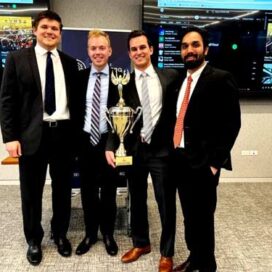Focus on ethics can dispel cynicism
Published: July 2, 2004 / Author: Oliver Management
COMPARED with 10 years ago, surveys of trust levels in countries throughout the world show that public trust in business institutions and leadership is at a low level.
Perhaps the most comprehensive and widely respected survey is that done under the leadership of the World Economic Forum, a nongovernmental organisation funded by more than 1000 of the world’s most influential corporations.
A forum report last year indicated that in a survey of 15 countries, the percentage of persons saying they had “a lot” or “some trust” in the executives of multinational companies averaged 33%.
That survey indicated the leaders themselves enjoyed less trust than the institutions they le d, and that attributes of leadership considered most important in placing trust were honesty and vision.
This is backed up by a survey this year conducted by Harris Interactive and the Reputation Institute, ranking the corporate reputations of the most visible firms in the US. This survey concluded “the majority of people” (74%) were still characterising the reputation of the corporate US as either “not good” or “terrible”.
At root, this lack of trust indicates a growing divide between the values of business and those of society. This most often results in public pressure for more regulation and legislation to control business, what economists call “transaction costs”. Francis Fukuyama, in his book on trust, shows how a low-trust society has higher transaction costs than a high-trust society and he likens these costs to a kind of tax.
Perhaps the most dramatic example of new transaction costs for business is the 2002 US Sarbanes-Oxley law: it has raised auditing expenses by 200%-300%.
The immediate causes of lack of trust in business are not hard to catalogue: financial frauds such as Enron, WorldCom and Parmalat; corporate governance approving exorbitant executive pay unrelated to showing; the rapid fall in world stock markets; and corporate deception.
Yet we need to understand the underlying nature of trust in order to offer strategies to renew trust.
The work of Onora O’Neill, principal of Newnham College, Cambridge, is helpful in probing the underlying nature of trust. O’Neill suggests placing and refusing trust is an age-old problem. Active inquiry asking questions and assessing answers, listening and checking information what is sometimes called the Socratic method, is the way we most often place or refuse trust. In O’Neill’s view, this suggests the need for complete openness and transparency in business.
While important, though, this is not the best remedy for restoring trust. We need to go further and give people the chance to ask specific persons in business about specific data and actions promulgated. By this process of active inquiry, a firm base to build and restore trust is realised.
Business, especially big business, must show it grasps it is a crucial part of contemporary society. The key to building and maintaining trust is to have continuing, open and honest communication available for all interested stakeholders. Supporters and critics alike must know they are able to engage in a dialogue with business officials and that they will be treated honestly and fairly.
Also, there is a need for independent external monitoring, verification and public disclosure to ensure these initiatives do not just add to public cynicism.
In some ways global business operating in SA is a model for the world. To the great surprise of many, this year’s forum survey on trust levels shows 63% of South African citizens trust global multinationals operating in the country. This represents more than 20% higher than the reported global average trust levels.
The research, done in SA by GlobeScan, indicates that, in part, this higher trust of companies in SA results from big firms listening and responding to the plea of citizens for antiretroviral drugs for those suffering from HIV/AIDS.
Firms such as Coca-Cola, Old Mutual, Anglo American, AngloGold, De Beers, Heineken, Ford, and DaimlerChrysler have a continuous dialogue with vital stakeholders and have provided medicines. Global firms have also become black economic empowerment leaders as part of their role as corporate citizens.
However, there is no substitute for men and women of character in leadership roles in business. Integrity is not just an instrumental value although good ethics is good business but rather integrity is an intrinsic value.
Business leaders are first of all human beings and only secondarily managers of wealth creation. To check your human values at the office door is to invite chaos. This is one lesson we have learned in the past five years.
Williams is academic director of the Centre for Ethics and Religious Values in Business at Notre Dame University in the US, and a Donald Gordon visiting fellow at the UCT Graduate School of Business.
/news_and_events/news_articles/article/3788/focus-on-ethics-can-dispel-cynicism
Related Stories




